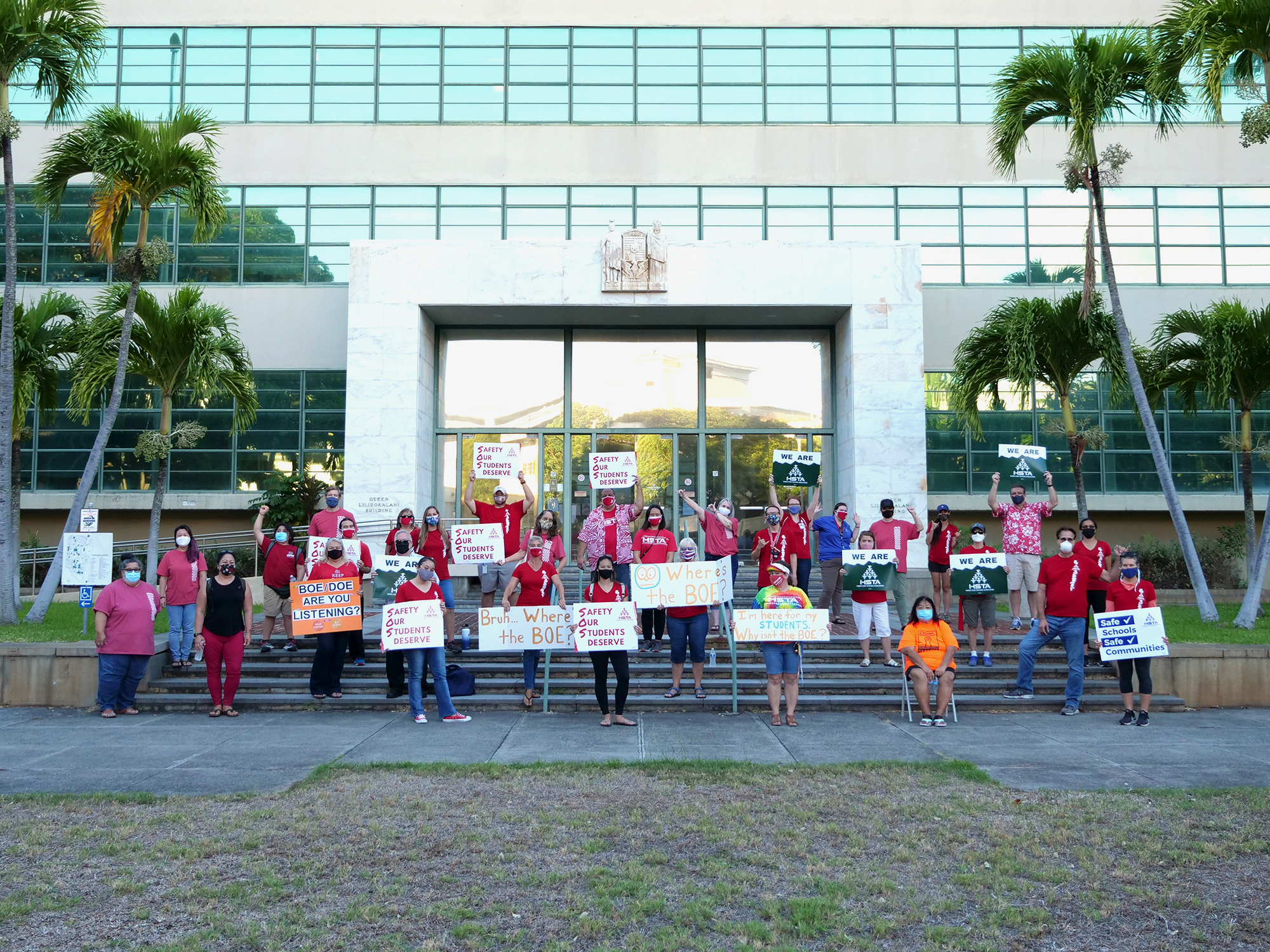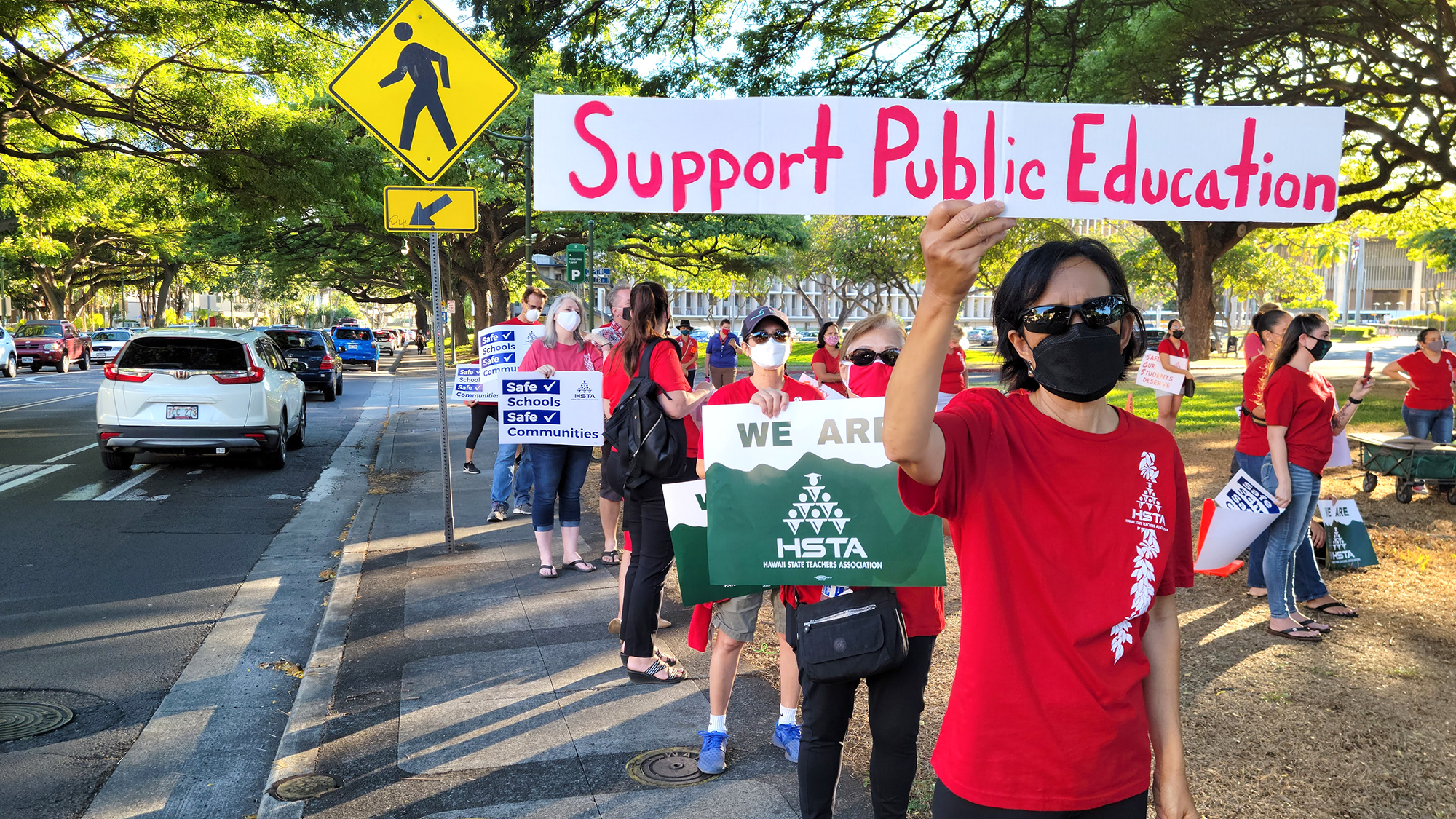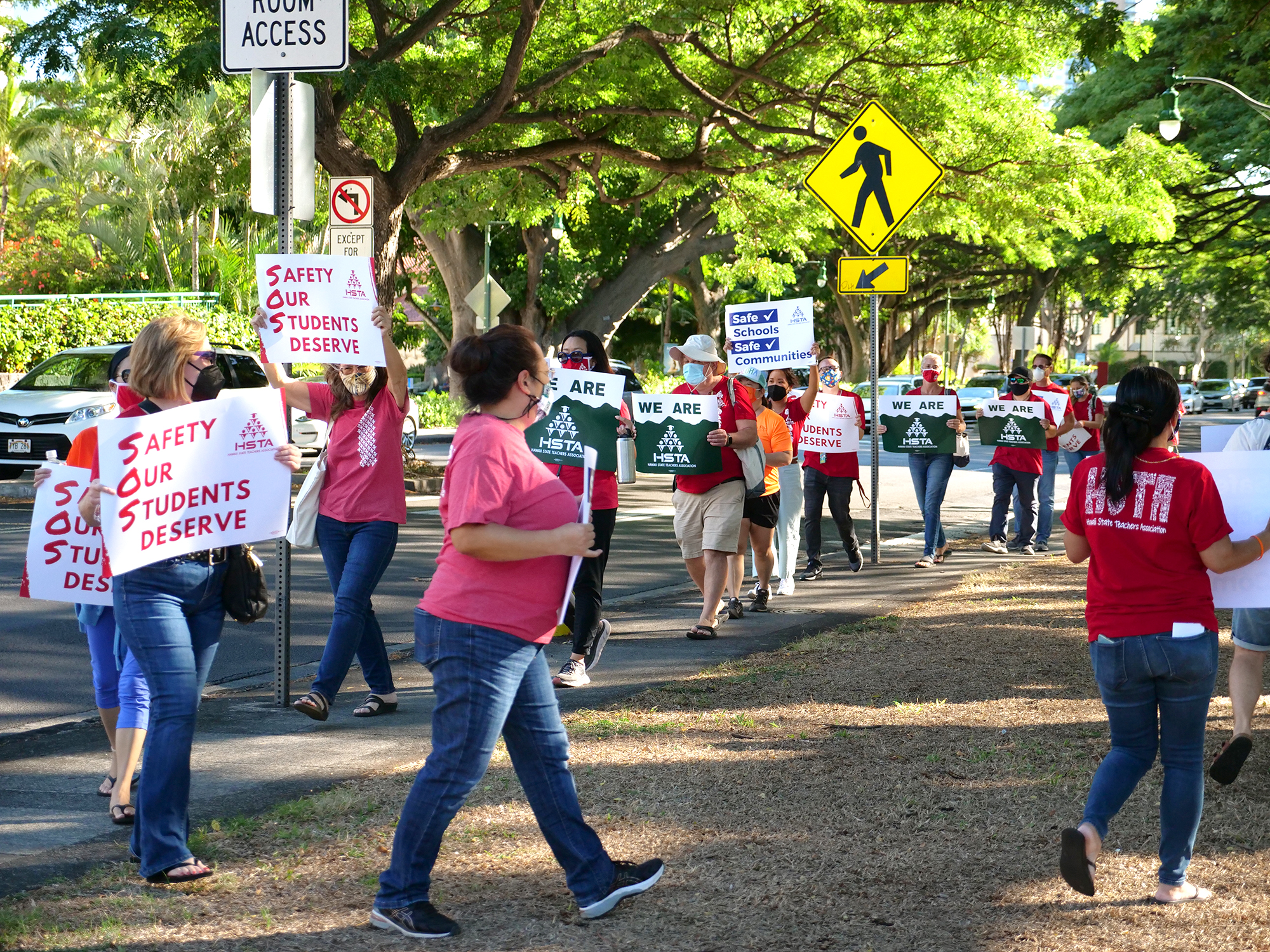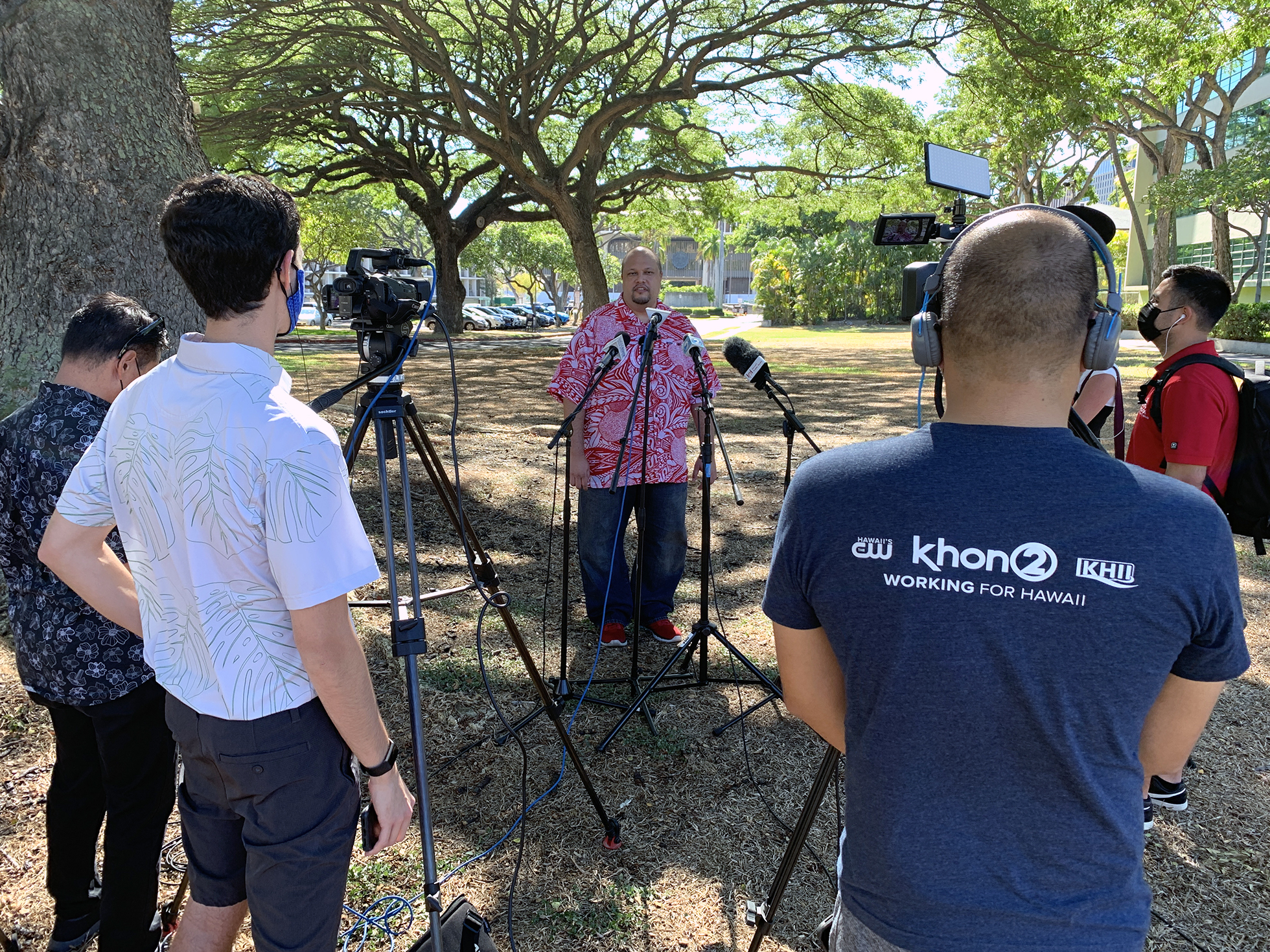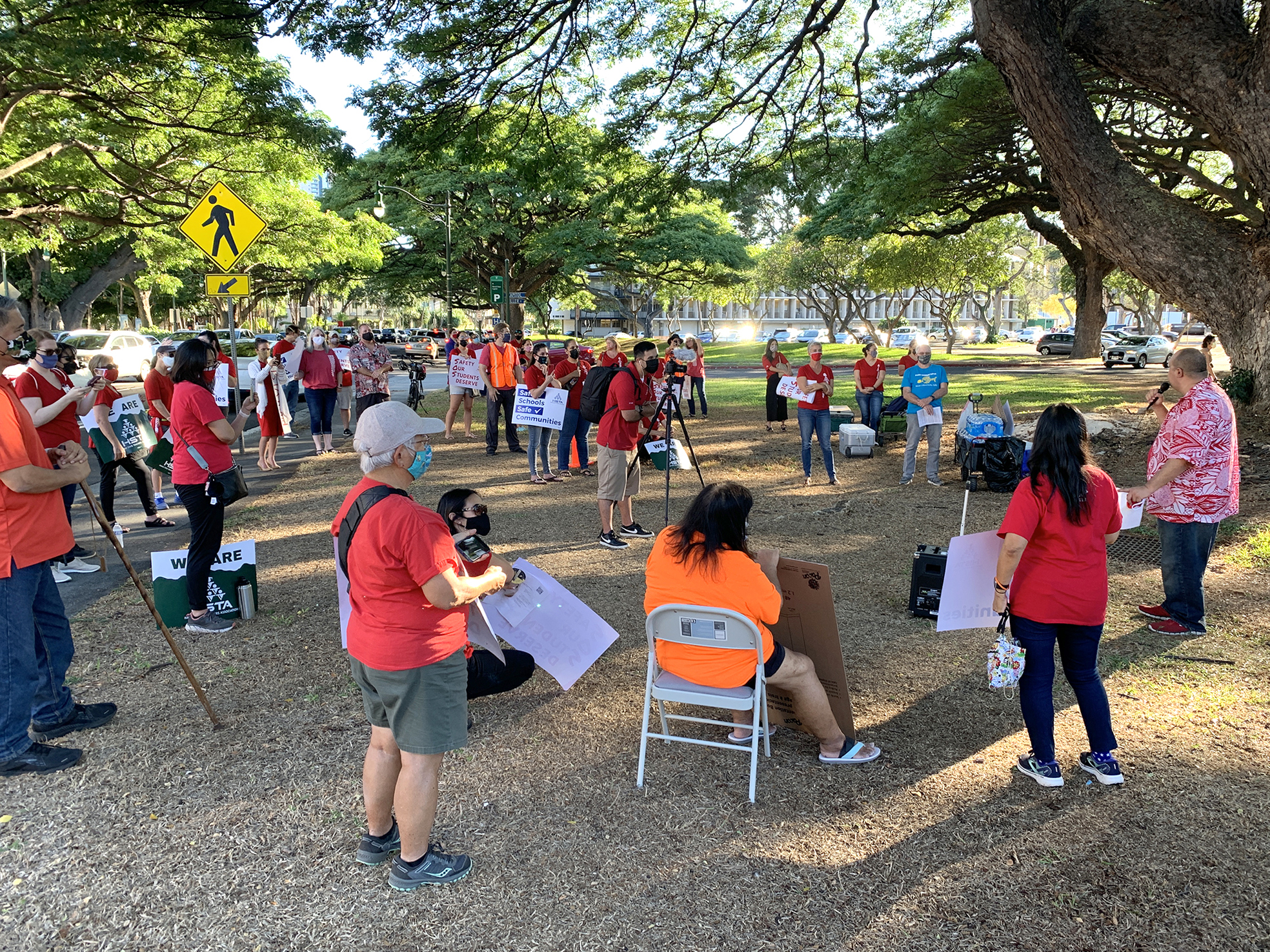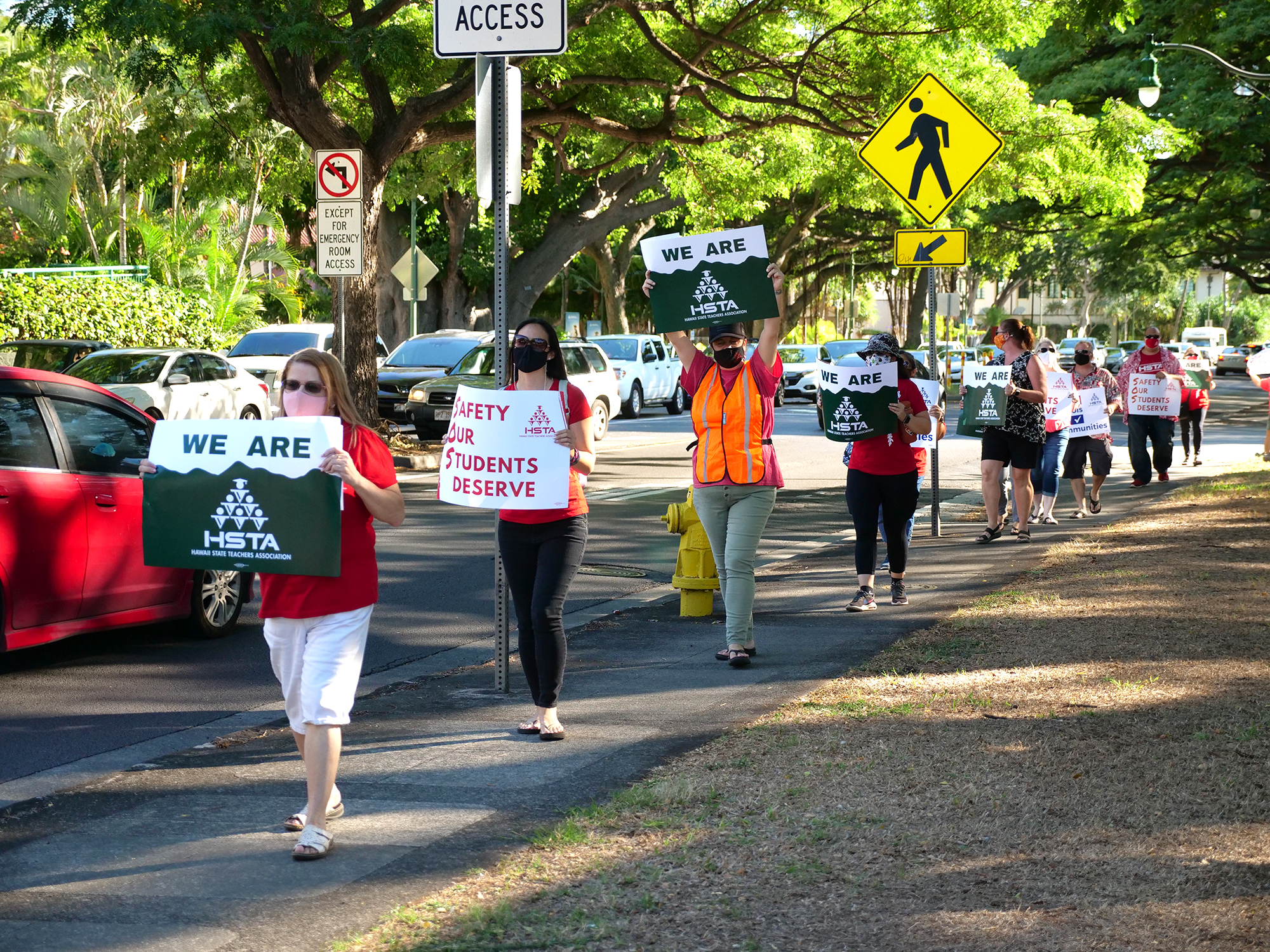HSTA president: ‘It’s time we hold the department accountable for what they’re saying.’
Updated: October 21, 2021
Dozens of educators and supporters gathered Wednesday to hold an informational picket in front of the Queen Liliuokalani building in downtown Honolulu, where the Hawaii State Department of Education (HIDOE) and Board of Education (BOE) offices are located.
More than 70 Hawaii State Teachers Association members, teachers, and supporters rallied after school, wearing masks and socially distanced, to call on the BOE to direct interim Superintendent Keith Hayashi and the HIDOE to negotiate consistent and comprehensive health and safety plans with HSTA.
The picket occurred just hours after the HSTA filed a prohibited practice complaint against the state for failing to bargain key health and safety issues during the pandemic.
HSTA President Osa Tui, Jr. held a news conference preceding the picket. “Our teachers have been in the classroom for a quarter now. They’ve been working very hard and diligently, and many of our administrators are doing everything they can to keep our schools safe, to keep our classrooms safe. But still there are issues that exist,” he said.
Among the concerns: inconsistent quarantine practices, in-person faculty and staff meetings being held in rooms with inadequate ventilation and distancing, inadequate distance learning options that are being staffed by new hires with no consideration for veteran qualified teachers, and the ongoing substitute teacher shortage which makes it difficult for teachers to teach and students to learn.
The HSTA wants “to sit down and hammer out some of these protocols and make sure that we can hold the department to account when they’re not following through with certain items,” Tui said.
HIDOE silencing teacher voice and unwilling to negotiate
Earlier Wednesday, HSTA filed a prohibited practice complaint (PPC) with the Hawaii Labor Relations Board over the HIDOE’s refusal to respond to two class grievances over unsafe work conditions and state’s mandate that unvaccinated education employees be tested for COVID-19 weekly.
In addition to failing to address the unsafe working conditions in schools, the state used Gov. David Ige’s emergency proclamation, which stripped away rights collectively bargained by suspending portions of Chapter 89 of the Hawaii Revised Statutes, as a blanket excuse to silence the voice of teachers.
“The department was not prepared (for the Delta variant) and now that the cases are coming down again and tourists are going to be let back in again, this is the time now to be able to sit down and work out some of the things that we want to make sure in case a new variant comes around that’s more virulent, that’s more transmissible,” Tui said.
Tui said the department produces its own health and safety guidance, yet is not held accountable when they fail to adhere to it.
Tui said, “When the 2020–21 school year started, we had a similar issue and we had to take it to the Hawaii Labor Relations Board, and although the governor had an emergency proclamation which suspended Chapter 89 of Hawaii’s collective bargaining law, the Hawaii Labor Relations Board still told the department they had to sit with us and work out issues.
“Well, we’re in the same position again. The department is willfully ignoring our request to sit down for grievances and arbitrations, and so we’re taking it to the Hawaii Labor Relations Board to ask them to force the department to sit with us,” Tui added.
In a statement to the media Wednesday, interim Superintendent Hayashi maintained, “Since May 2020, the department has been – and remains committed to – meeting monthly with the HSTA to discuss COVID-related issues and how we can provide clarity.”
But Hayashi and top HIDOE officials also emphasize that these meetings are “informal” and non-binding. During these meetings, HSTA continuously asks for clarification and updates on ongoing safety concerns, and frequently the department’s top officials offer no specific advice or few detailed responses.
Teachers face numerous unresolved safety, education concerns
Ongoing safety issues and the lack of consistent and comprehensive safety protocols have teachers and students suffering in the classroom and at home.
Lisa Morrison, an arts and communications teacher at Maui High School, expressed the disparity felt by students on the neighbor islands.
“I think that there’s more inequity for students this year than there was even last year, because we have students at school able to stay at school who are receiving lessons, and then those who have to go home and there’s very little available for them,” Morrison said.
Distance learning options for students on quarantine are spotty at best, and there’s little guidance at the state or complex area levels on how to implement it, she added.
Morrison, whose own children attend public school, expressed frustration over a lack of support when students are sent home to quarantine.
“I didn’t even make it through the first quarter without both of my children at separate times being sent home to quarantine for 10 days because they were considered a close contact,” Morrison said. “In one case, the entire grade had to shut down because the teacher got COVID, and you bet it interrupts everything in your schedule. We know that members of our community are scrambling to get childcare when that happens. But more importantly, we’re upset that the department wants to turn a blind eye to this and not even treat it as an issue and try to come up with solutions.”
Morrison said the lack of safety protocols has led to substitute shortages of more than 100 positions a day across the state.
Morrison and other teachers questioned why some principals and other administrators are insisting on holding in-person staff meetings in libraries, auditoriums and other confined spaces when they can easily hold those meetings online and did so all last school year because of the pandemic.
“I don’t understand why a school would want to put all teachers at risk, because once you have a few teachers out, then you actually have an impact on student learning. As soon as a substitute hears that there’s a COVID outbreak at a school, they don’t want to take a substitute job at that school.”
Tui shared the frightening reality that, “Our teachers every day are seeing multiple classes being taken and put into cafeterias, being put into auditoriums, being put into the library and watched by maybe a security guard or some other faculty member or staff member on campus, because there is just a lack of substitutes.
“Many of our substitutes are reporting that they get dozens of calls every day asking for substitute teachers, and it’s not happening. And so our teachers on the front lines working now are having to shoulder that load, figure that out, and work with them, and our students are suffering as a result. They are not getting the education they deserve,” Tui said.
Educators want opportunity to work together, collaborate
The agenda for Thursday’s monthly BOE meeting, which took place the day after the picket, contained no discussion or action items related to school safety. “They’re over it. They’re done with it,” Tui said.
Tui says he plans to call on the board to direct the superintendent and HIDOE to enter negotiations since the department will not do so willingly: “Our contract says that we have a right to put things onto the agenda, and you can bet we will be putting something on their November agenda.”
What many teachers want is a chance to be heard and to collaborate on solutions.
Dave Dunaway, Jarrett Middle School math teacher, expressed that as a state agency, the HIDOE should be embracing and promoting aloha.
“I would like to see more of the state or the Department of Education being a little bit more kind, being a little bit more adopting of lōkahi (unity),ʻoluʻolu (agreeable), and haʻahaʻa (humility). I want that, especially for our whole community. It’s not us against them. We’re supposed to look at it through, I would say, a heavenly perspective looking down and ‘We’re all in this together.’ That’s how we should be doing it.”
Tui concluded that “we don’t have a lot of asks,” and he just wants to “sit down and address and work together, because the keiki, they are worth it. They are worth sitting down and getting this worked out.
“If we have to go to court, then we will go to court,” Tui said.
Related news stories
Photos
